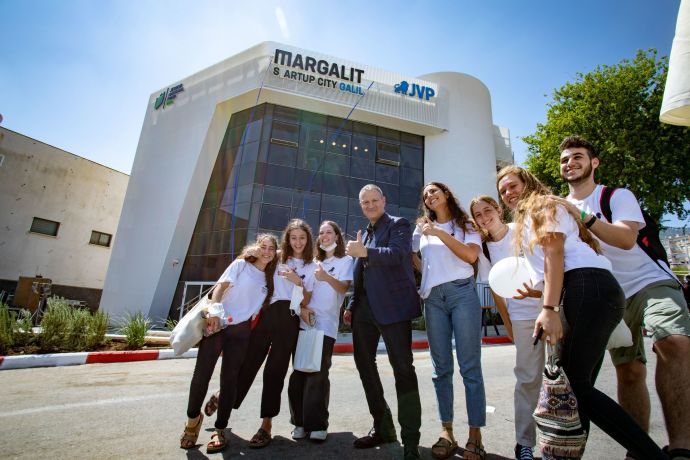‘The concept that any business activity dealing with innovation must come from Tel Aviv is wrong. There are major innovations such as food tech, agro-tech and digital health that seek their resources elsewhere,” explains Dr. Erel Margalit, founder and chairman of VC fund JVP and Margalit Startup City.
Margalit cautions that Israel has a workforce crisis that is being felt throughout the hi-tech industry.“Israel needs to open up hi-tech to new communities in new regions. It must create innovation centers in the Periphery and establish new growth areas.
“Hi-tech cannot stay in the ivory tower and must be made accessible to many more people, by educating early on. Technology and hi-tech will be the driving force for political change in the region.”
Developments are exciting: “Regional changes with Arab countries have opened a huge new global market that we have not known in decades,” he notes. “The next unicorns will come from regional technological collaboration. The government must focus considerable resources on different parts of the country, provide the necessary incentives for companies to integrate the distinct populations, and establish the first university in the Galilee.”
Margalit, one of Israel’s top hi-tech leaders, is responsible for the establishment of Margalit Startup City – a model of leading innovation centers throughout Israel and the world. The centers’ model is based on connecting investors, government officials, start-ups, academia and multinational corporations with social and cultural entrepreneurship.
Together, they produce an engine of regional economic growth and new jobs, changing the reality of life for many people.
Last September, Margalit launched Israel’s International Food-Tech Center, Margalit Start-Up City Galil, in Kiryat Shmona.

The center in the Galilee, which is a home for collaboration and partnership between major multinationals, start-ups and academia, is focused on developing solutions to some of the world’s most pressing problems such as smart agriculture, global warming, alternative protein, global famine and the need for healthier food. It will change employment in the region and turn the Galilee into an international powerhouse in the field.
“The Galilee has the research institutes of the kibbutzim and moshavim, extensive agricultural activity and different approaches of agriculture due to the diverse population, which includes Jews, Arabs and Druze,” explains Margalit.
The center is based on a unique ecosystem model connecting the Galilee kibbutzim and settlements in the area, city-dwellers and kibbutzniks, secular and religious, Arabs and Jews.
The center has already had a tremendous impact on the area educational system through the creation of special programs for entrepreneurship and food-tech studies. The children of Kiryat Shmona and the Galilee communities will study in particular technology and entrepreneurship tracks, working together with Margalit Startup City Community - Community, the social organization founded by Margalit over 20 years ago, which brings technological education to schools and students.
Among the companies that have already joined the center are JNF, Cisco, the Luzzatto Group, Deloitte, Bank Hapoalim, MIGAL Galilee Research Institute, Tel Hai Academic College, Galilee Development Company, Fischer, Behar, Chen, Digital Valley and others.
“This is an amazing opportunity to create something new – something that is not being done elsewhere – and become a leader in Israel and the world,” adds Margalit. “Recently, I was presented with the possibility of opening a second building in Kiryat Shmona, and I saw the number of companies, both international and Israeli, that need innovation and want a presence in the center. They are interested in being in a location that provides all of the support, whether it is our mentors, financial investments or access to the most advanced research data in the field.
“These kinds of centers are the best chance for a place like Kiryat Shmona, or the Galilee region, to be a player on the international stage.”

The Food Tech Center in the Galilee joins the international innovation centers established by Margalit in Jerusalem, Beersheba, Haifa, Tel Aviv and New York. The goal is to create a hub that connects Israeli entrepreneurs to the international market from Israel’s north to south.
Two years after its launch, the New York center has become home to 35 leading companies and 350 employees. This is in addition to collaborations with major universities such as NYU, Cornell, Columbia and CUNY.
Says Margalit: “Israeli hi-tech was one of the most important and central factors that led to the opening of the city during the challenging period of the COVID outbreak, marking it as a center that continues to connect different countries and groundbreaking innovation.”

Similar collaborations also exist in Margalit’s innovation centers in Israel.
A new venture was recently launched in Haifa’s lower district – an accelerator for entrepreneurs in digital health. The project’s strength lies in the links it has forged between the leading players in the field in Israel, such as Rambam Health Care Campus and Bnei Zion Medical Center, academic institutions in the North such as the Technion – Israel Institute of Technology, government bodies and private and public companies in-country and around the world. Other partners include Philips, the Israel Innovation Authority, Road 2, Super-Pharm, IBM, NVIDIA and more.
“Haifa is not the periphery, but because of its urban perception, it has lost some of its young people,” explains Margalit, who grew up in nearby Carmiel. “Over the years, commerce and hi-tech left the city, and one of the goals is to bring the young people back, to interact in the city’s business and development areas.
“If you want to abandon the city’s refineries, you need to think of an alternative model, one which will provide quality of life alongside high-income employment and technological leadership in key areas, such as digital health,” he emphasizes.
One of the key companies highlighting the potential of the northern region is Nanit, which originated at the Technion in Haifa, and developed a sophisticated digital camera that monitors sleeping babies. The successful partnership between the Technion and New York’s Cornell University has resulted in a market leader that has generated $60 million in sales and is making an impact globally.
“This illustrates the fundamental difference between Israeli and European companies,” Margalit states. “Europeans usually stay in one place because their country of origin is large, while we look at Europe, the United States, and today, the Arab market.
“We have innovations and developments that produce real drama at the international level. Fourteen of our companies are already recognized in Dubai and Abu Dhabi, and we’re entering other places in the world. There are many investments in the region, and Israel can be part of it.”
Under Margalit’s leadership, the JVP family of funds has invested in more than 160 companies to date, raised $1.6 billion, led dozens of exits, including 12 IPOs in the NASDAQ, and was ranked as one of the six leading venture capital funds in the world in terms of top quartile performance. Margalit, who was the chairman of top global company CyberArk, serves as chairman of the unicorn Earnix and other leading companies such as ControlUp, Nanit, Centrical and Anyclip. He was the principal investor in CyberArk, QlikTech and Cogent Communications – among the most prominent unicorns to emerge from Israel.

But beyond his extensive business activity, Margalit also solved the social model of hi-tech. He realized that hi-tech must emerge from the bubble in the country’s Center and open itself to new geographical sections and new populations: the Galilee, the Negev, the Arab and haredi sectors.
He stresses that this must happen in the next five years – otherwise, Israel will be left behind. “The year 2021 has proven that technology and hi-tech are the most significant growth drivers in Israel, in its revenues, in its resilience to any global crisis and in the creation of jobs.
“In our Jerusalem center, we deal with AI and cloud technologies. About 15 years ago, there was almost nothing here, and now there are over 20,000 hi-tech jobs, and the biggest exits have come from the capital. This is proof that other populations are also entering hi-tech today – haredi and Arab youth. This market needs quality workers, and instead of looking for them in Ukraine or India, it’s time to look to the east of the city and to the haredi neighborhoods.”
Margalit emphasizes the importance of government involvement in the economic development of the areas far from the Center. “The officials in the ministries of Economy and Finance are very much with us. Prime Minister Naftali Bennett, Interior Minister Ayelet Shaked, Economy Minister Orna Barbivai, and Science and Technology Minister Orit Farkash-Hacohen also have confidence that they see business activity happening in the field. However, this has not yet translated into a national allocation of resources, and much of the work should be in the economic development of the region,” he explains.
“I cannot only look for companies and start-ups from Israel. I must reach out to all the multinational companies in the world, explain to them the potential of what is happening in Israel and the advanced research that is here. The state should understand its role in marketing the region in the world because we are not alone, and there is a great deal of competition in the world. This should be part of the national narrative to deepen the connection between the business sector and the region.”

Margalit has been connected with social issues for many years. Twenty years ago, together with his wife Debbie, he founded the social community program “Margalit Startup City – in the Community” to reduce social gaps. To date, it has worked with over 45,000 children and youth through 800 national service volunteers. Margalit, whose father Itzik was the head of a community center and whose mother Miki, was an educator, views education as the best opportunity.
“I cannot feel complete until I make sure that children in the North, South and Periphery will be involved,” he affirms. “The connection between social action and economic action creates a feeling of completion and great happiness. Recently I was surprised to see schools that have followed in our footsteps and have also introduced technology and food-tech to the curriculum. I sat with the kids, and it was so exciting.
“You feel like you are helping to develop a positive, snowball effect, creating a new language in a region that was used to talking about itself in terms of distress – but that is now using terms like leadership and excellence.”
Translated by Alan Rosenbaum.
This article originally appeared in ‘Maariv'.
The JVP Fund, established in 1993 by Erel Margalit, is one of Israel’s leading venture capital funds. To date, it has invested in over 160 early- and late-stage technology companies in cyber, fintech, food-tech, agro-tech, media, digital healthcare, big data and media.
JVP has developed 10 funds totaling over $1.6 billion and has been ranked by Preqin and others as one of the 10 best-performing venture capital funds in the world. The fund has led dozens of exits, including some of the most prominent in the Israeli venture capital industry, along with dozens of mergers and acquisitions. JVP led 12 IPOs on the Nasdaq and dozens of mergers and acquisitions, including CyberArk Software ($6.7 billion), QLIK Technologies ($3 billion), Cogent Communications ($3.6 billion) and other companies.
Margalit Startup City and JVP operate leading innovation centers in Israel, including the Media and FinTech Center in Jerusalem, the International Foodtech Center in the Galilee, the International Center for Digital Health in Haifa, the Cyber Center in Beersheba and Tel Aviv, and the International Cyber Center of New York City. These innovation centers are a role model and a magnet for building strategic collaborations with many sectors and technology giants from around the world. In addition, JVP is exploring the possibility of opening new centers in Europe and the Arab world.
